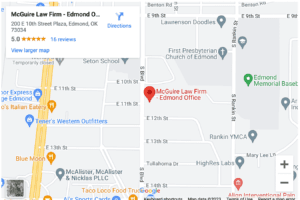Should I Accept a Settlement Offer from the Insurance Company?

When you are injured in an accident, you might be entitled to compensation for your injuries and other damages. In most personal injury cases, you must prove that the other party was at-fault for the cause of your injury.
Once you prove fault, you could be entitled to compensation for your physical injuries, economic damages, pain, and suffering.
If the party has insurance coverage for the claim, the insurance company generally handles the claim.
The insurance provider investigates to determine if its insured is liable. If the company determines its insured caused your injury, it may make a settlement offer to resolve your insurance claim.
If you do not have a personal injury attorney handling your claim, the insurance settlement offer may be much lower than your claim is worth. Insurance companies often take advantage of a victim’s lack of knowledge about the law and how to value damages to underpay injury claims.
What Do You Need to Know Before You Accept a Settlement Offer From an Insurance Company?
Accepting a settlement offer from an insurance company impacts your legal rights regarding your injury claim. In general, you don't want to accept the first offer. Let's look at three important things to know about settlement offers.
You Cannot Demand More Money
When you accept a settlement offer, you cannot demand more money after your claim is paid. Even if you discover additional damages or you need additional medical care, you cannot demand that the insurance company or the at-fault party pay more money for your damages.
You Release All Claims Related to the Injury
The settlement agreement written by an insurance provider releases all claims related to the injury. It does not matter whether you knew about a potential claim. When you accept the settlement offer, you release all known and unknown claims related to the injury, accident, or incident.
You Release All Parties From Liability
The settlement agreement also releases all parties from liability for the claim. The release applies to known and unknown parties that could have liability for your injury and damages.
The above three things about settlement agreements apply in all personal injury cases, including car accidents, product liability claims, slip and accident cases, dog bite claims, and medical malpractice claims.
Having a personal injury lawyer review your case before accepting a settlement offer from an insurance company can help ensure you receive a fair settlement amount. An insurance adjuster might tell you that you do not need an attorney or that an attorney only takes money out of your pocket. However, that advice benefits the insurance company instead of benefiting you.
Things to Consider Before Accepting a Settlement Offer
Before agreeing to accept a settlement offer, consider these questions:
Are You Receiving Compensation for All Damages?
The insurance company will not tell you if the settlement offer compensates you for all damages. It is up to you to know if you are receiving compensation for all damages.
Damages in a personal injury case can include:
- Medical bills and expenses
- Physical pain and suffering
- Disabilities and permanent impairments
- Lost wages and benefits
- Decreases in earning potential
- Emotional and mental trauma and distress
- Personal care costs and long-term care costs
- Loss of quality of life or enjoyment of life
- Scarring and disfigurement
- Future damages related to permanent impairments
- Vehicle repairs
In addition to knowing whether the settlement offer compensates you for all damages, it is up to you to know whether the amount being paid is fair. Therefore, you need to understand how to calculate the value of pain and suffering damages, as well as the value of your financial losses and economic damages.
If you believe your claim is worth more money, you can make a counteroffer to the insurance company. The company may negotiate a higher payment for your claim.
Have You Completed Medical Treatment?
Settling an injury claim before you complete medical treatment could result in a much lower settlement offer. An insurance company might try to settle your claim before you complete treatment for your injuries. The reason is that the insurance company is trying to pay as little as possible for your claim.
You simply can’t know the full extent of your injuries until you’re released by your doctor. You could require additional physical therapy or surgery to treat your injuries. You could sustain a permanent impairment or disability, which could increase your claim’s value substantially.
Maximum medical improvement or MMI is the point at which no further medical treatment is expected to improve your condition. For some accident victims, MMI means a full recovery. For other victims, MMI includes a disabling condition, scarring, impairment, or disfigurement.
If you settle your claim without completing medical treatment, you are responsible for any additional medical bills, costs, or financial losses incurred after the settlement. You may also not receive full value for your pain, suffering, and other damages.
Could You Be Partially to Blame for the Accident or Your Injury?
In some cases, accepting a settlement offer that might be a little lower than the value of your injury claim is a calculated legal judgment. If you could be partially at fault for the cause of your injury, going to try could be risky.
Under Oklahoma’s comparative negligence law, you are barred from receiving any money for a personal injury claim if you are 51 percent or more at fault for the cause of the accident or injury.
If the jury decides that your fault is under 51 percent, you might still receive compensation for your injury claim. However, the amount of compensation you can receive is reduced by your liability for the accident. For example, if the jury finds that you were 40 percent at fault, your compensation is reduced by 40 percent.
Is the Statute of Limitations for Your Claim About to Expire?
In most cases, individuals must file a personal injury lawsuit within two years of the date of their injury. If they do not file a lawsuit before the deadline expires, they lose the right to file a claim in court for damages.
However, the statute of limitations for personal injury cases could be shorter or longer in some cases. For example, cases involving government entities have extremely short deadlines.
It is generally in a person’s best interest to contact a personal injury lawyer as soon as possible after an accident. An attorney calculates the statute of limitations to determine the deadline for filing a personal injury lawsuit.
Contact Our Oklahoma Personal Injury Lawyer for a Free Consultation
You do not need to try to handle your personal injury claim alone. Schedule a free consultation with our Oklahoma personal injury lawyer to discuss your case. You receive an honest assessment of your case so that you can make a decision that is in your best interest.

